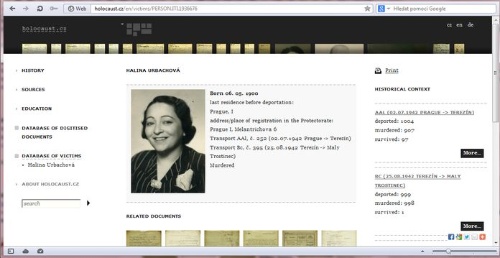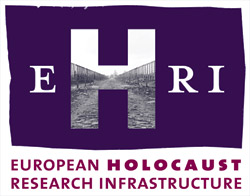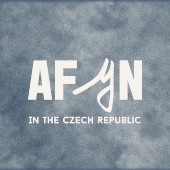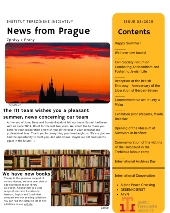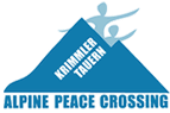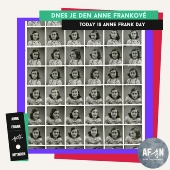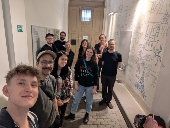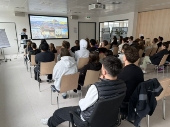Database of Holocaust Victims
The Terezín Initiative Institute attempts to document names and fates of all prisoners of the Terezín ghetto and of other victims of the "Final Solution of the Jewish Question" in Czech Lands and to use this data in order to assist commemoration and promote Holocaust education. The information gathered in the framework of this documentation project is made available for survivors, family members, but also to the public, to historians and in the frame of our educational projects to schools.
 The first results of the documentations Project were the Terezín Memorial Books.
The first results of the documentations Project were the Terezín Memorial Books.
What does the database contain?
The databse contain the short data about all of the prisoners of Terezín Ghetto deported in from Czech Lands, Germany, Austria, Nederland, Denmark, Slovakia. You can find the data relating to the people thay came to Terezín with the death marches in the last months of the was (so called evacuation transports) and the information about the Jews deported from Czech Lands directly to Lodz Ghetto, Auschwitz, Minsk and Ujazdow. The internal system contains the data of survivors, but though the Law on Protection of Personal Data we can not to publish them online.
What does the particular record in the database contain?
The record of every single person contains:
name, date of birth, transport to Terezín or any other camp or ghetto, fate (dead, liberated*, fate unknown*) or any other information: date and place of death, transport from Terezín, place of liberation* etc.
In many cases (mainly in Prague) we can find out the persons through the address of the las residence before the transport.
We add to the single records the authentic documents and photos of the Holocaust Victims in the frame of our extensively project Terezín Album.
Where can I find the Database of the Holocaust Victims?
The onlive version of the databse is available on the holocaust.cz websites.
As said there are just the data of the people they have not survived the Holocaust. If you are interested in the information about the Survivors, have any other questions or if you want to offer us you own materials (photos, documets, etc.) to add in the database, please contact us by e-mail: database@terezinstudies.cz.
You can support us financially
Three weeks have already passed since the International Youth Forum started in South Carolina, hosted by the Anne Frank Center at the University of South Carolina (USC). Our very own Ani from Afyn.cz was one of the delegates. She has shared her reflections on the experience, what she learnt, and what she will take away from it. Read her report to get a glimpse of the IYF 2025!
It's the middle of summer, and we're bringing you the latest issue of our newsletter, News from Prague. We wish you a wonderful rest of your vacation and enjoyable reading.
This week, a group of students from the US (some with Czech family ties) has visited us as part of their summer school in the Czech Republic organised by the Mestenhauser Institute for International Collaboration (MIIC).
Our GEDENKDIENST-Volunteer Laurenz joined the Alpine Peace Crossing (APC) in Krimml to cross the Austrian Alps in remembrance of the thousands of Jews who fled the antisemitism that was still rampant in Europe after 1945. Laurenz welcomed the team to Jachymka a few weeks ago.
Yesterday we celebrated Anne Frank's legacy in a creative way by showcasing the artworks submitted by talented contributors at Žižcafé Therapy.
On Saturday our GEDENKDIENST volunteer Laurenz welcomed the team of the Alpine Peace Crossing to Jachymka to show them our work.
Alpine Peace Crossing (APC) is an Austrian organization based in Krimml (Salzburg province).
Our Volunteer Laurenz was in Austria last week to promote the GEDENKDIENST program at his former school, the HAK 1 in Salzburg. Speaking to about 60 people from the 4th grade he talked about his experiences and encouraged the students to also use the opportunity to do a Gap-Year with a positive impact. Besides the remembrance work and the work and history of our institute, Laurenz told the students about the challenges and the many wonderful things that come with moving abroad and starting a new job fresh out of school.
We want to thank the HAK 1 business school in Salzburg for giving Laurenz the opportunity to promote the program and the students for their keen interest.

